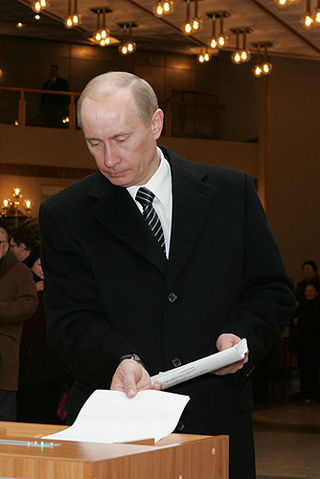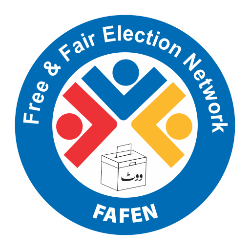Related Research Articles
Elections for the Palestinian National Authority (PNA) were held in Palestinian Autonomous areas from 1994 until their transition into the State of Palestine in 2013. Elections were scheduled to be held in 2009, but was postponed because of the Fatah–Hamas conflict. President Mahmoud Abbas agreed to stay on until the next election, but he is recognized as president only in the West Bank and not by Hamas in Gaza. The Palestinian National Authority has held several elections in the Palestinian territories, including elections for president, the legislature and local councils. The PNA has a multi-party system, with numerous parties. In this system, Fatah is the dominant party.
The International Foundation for Electoral Systems (IFES) is an international, non-profit organisation founded in 1987. Based in Arlington, Virginia, United States, the organization assists and supports elections and electoral stakeholders. Since 1987, IFES has worked in 145 countries and has programs in more than 50 countries throughout Asia-Pacific, Africa, Eurasia, the Middle East, and North Africa, and the Americas.

Election monitoring involves the observation of an election by one or more independent parties, typically from another country or from a non-governmental organization (NGO). The monitoring parties aim primarily to assess the conduct of an election process on the basis of national legislation and of international election standards. There are national and international election observers.

Presidential elections were held in Ukraine on 17 January 2010. As no candidate received a majority of the vote, a run-off election was held between Prime Minister Yulia Tymoshenko and opposition leader Viktor Yanukovych on 7 February.

The Election Commission of Pakistan (ECP) is an independent, autonomous, permanent and constitutionally established federal body responsible for organizing and conducting elections to the national parliament, provincial legislatures, local governments, and the office of president of Pakistan, as well as the delimitation of constituencies and preparation of electoral rolls. As per the principles outlined in the Constitution of Pakistan, the Commission makes such arrangements as needed to ensure that the election is conducted honestly, justly, fairly and in accordance with law, and guard against corrupt practices. The Election Commission was formed on 23 March 1956.

The fairness of the 2008 Russian presidential election is disputed, with election monitoring groups giving conflicting reports. Most official reports accept that not all candidates had equal media coverage and that some election monitoring groups had restricted access to perform their role. Monitoring groups found a number of other irregularities, but made no official reports of fraud or ballot stuffing.

Peter Erben is a senior electoral manager with global experience in directing, advising and supporting complex elections in post-conflict, transitional and developing countries, usually working for or along with the European Union, the Organization for Security and Co-operation in Europe (OSCE), the International Foundation for Electoral Systems and the United Nations.

Veeravalli Sundaram Sampath served as 18th Chief Election Commissioner (CEC) of the Election Commission of India from 2012 to 2015. He succeeded S. Y. Quraishi as the Chief Election Commissioner on 11 June 2012. Born on 16 January 1950, Sampath retired on 15 January 2015 when he attained 65 years of age.
The Elections Reform Support Group (ERSG) was a forum of donors co-chaired by the United States and the European Union to coordinate the reform of the Palestinian electoral system. ESRG was founded in 2002. Members include the states of Denmark, Germany, Greece, Ireland, Italy, Japan, the Netherlands, Norway, Spain, Sweden, the United Kingdom, and the United States. Also international organizations such as the European Commission, the office of the European Union Presidency, the United Nations and the United Nations Development Program participate in this program. International Foundation for Electoral Systems supported the forum in secretarial role.
Electoral boundary delimitation is the drawing of boundaries of electoral precincts and related divisions involved in elections, such as states, counties or other municipalities. It can also be called "redistribution" and is used to prevent unbalance of population across districts. In the United States, it is called redistricting. Unbalanced or discriminatory delimitation is called "gerrymandering." Though there are no internationally agreed processes that guarantee fair delimitation, several organizations, such as the Commonwealth Secretariat, the European Union and the International Foundation for Electoral Systems (IFES) have proposed guidelines for effective delimitation.
The Electoral Institute for Sustainable Democracy in Africa, or EISA, is an organization founded in 1996 in Johannesburg to "promote credible elections, participatory democracy, human rights culture and the strengthening of governance institutions for the consolidation of democracy in Africa."
The Association of European Election Officials or ACEEEO was an organization of election management bodies founded in 1991 to promote the institutionalization and professionalization of democratic procedures in Europe. The organization held annual conferences to discuss theoretical and practical issues important to its members. It dissolved on 11 March 2022 in response to the 2022 Russian invasion of Ukraine.
The Institute for Election Systems Development (IESD) is an organization founded in 1999 to promote democracy in Russia.
The Election Support Group (ESG) is an internationally sponsored organization which means to provide analysis and support to the electoral process in Pakistan. The secretariat for the group is the Pakistan branch of the International Foundation for Electoral Systems.
Pakistan receives foreign aid from several countries and international organizations.

Presidential elections were held in Azerbaijan on 9 October 2013. The result was a victory for incumbent President Ilham Aliyev, who received a reported 85% of the vote, whilst leading opposition candidate Jamil Hasanli finished second with a reported 6% of the vote.

Snap parliamentary elections were held in Ukraine on 26 October 2014 to elect members of the Verkhovna Rada. President Petro Poroshenko had pressed for early parliamentary elections since his victory in the presidential elections in May. The July breakup of the ruling coalition gave him the right to dissolve the parliament, so on 25 August 2014 he announced the early election.

Presidential elections were held in Azerbaijan on 11 April 2018. The elections were the first since the 2016 constitutional referendum, which extended the presidential term from five to seven years. Incumbent President Ilham Aliyev was re-elected president for a seven-year term.

Free and Fair Election Network (FAFEN) is the first-ever network of civil society networks in Pakistan dedicated to strengthening democracy through methodically-enacted observation and oversight of electoral, parliamentary, and governance processes. As many as 20 regional networks of over 500 tehsil-level civil society organizations are part of FAFEN, establishing its unmatched outreach to communities of people belonging to all classes, ethnicities, and religions across Pakistan. FAFEN’s work since its inception in 2006, has made it one of the most credible voices in the country for responsive, transparent, accountable, and efficient electoral, legislative, and local governance.So far, FAFEN has observed the General Elections in 2008, 2013 and 2018, Local Government Elections in 2015, and Legislative Assembly Elections in Gilgit-Baltistan in 2009 and 2015, with active support of its partner organizations as well as duly accreditation from the Election Commission of Pakistan (ECP). FAFEN has earned an excellent reputation among various stakeholders, including the Election Commission of Pakistan (ECP) and National Database and Registration Authority (NADRA) and has been recognized as an authentic organization among political parties, civil society organizations, international community, academia, and the media. After the General Elections 2013 various political parties levelled multiple charges of rigging, on which the Supreme Court of Pakistan had formed a Judicial Commission to investigate the matter. FAFEN was the only civil society organization, which was summoned by the Supreme Court of Pakistan to share its election observation findings.

Rajiv Kumar is a former Indian Administrative Service officer. On 15 May 2022, he assumed the charge as the 25th Chief Election Commissioner of India, succeeding Sushil Chandra.
References
- ↑ Support to the Electoral Process (STEP). USAID Afghanistan, July 20, 2009. Accessed July 22, 2009.
- 1 2 IFES and Azerbaijani CEC prolong term of cooperation memorandum. AZ Today, December 16, 2005. Accessed July 08, 2009.
- ↑ Number of international observers reaches 1060 APA, October 31, 2005. Accessed July 08, 2009
- 1 2 Mezahir Penahov received representatives of USAID and IFES AZ Today, October 5, 2005. Accessed July 08, 2009.
- ↑ CEC chairman Mezahir Penahov visiting UK. AZ Today, March 03, 2007. Accessed July 08, 2009.
- 1 2 "AZERBAIJAN: THE INTERNATIONAL REPUBLICAN INSTITUTE IS LEAVING BAKU". Eurasianet. 5 November 2009.
- 1 2 3 Mehboob, Ahmed Bilal. Lessons from the Bangladesh polls, The International News February 02, 2009. Accessed July 27, 2009.
- ↑ Results from Wave XIV of Tracking Surveys (PDF), International Foundation for Electoral Systems, 1 July 2004, p. 5, archived from the original (PDF) on 29 November 2008, retrieved 2009-06-28.
- ↑ na Thalang, Chanintira (June 2005). "The Legislative Elections in Indonesia, April 2004". Electoral Studies. 24 (2): 326–332. doi:10.1016/j.electstud.2004.10.006.
- ↑ "Targeted Election Management Assistance". USAID. 20 November 2009. Retrieved December 6, 2009.[ permanent dead link ]
- ↑ EIGHT INT'L INSTITUTIONS TO MONITOR ELECTIONS IN ACEH TMCnet via Asia Pulse Data Source, April 07, 2009. Accessed July 29, 2009.
- ↑ Computerised electoral rolls system installed Archived 2008-09-28 at the Wayback Machine Daily Times (Pakistan), September 10, 2008. Accessed July 23, 2009.
- 1 2 Tufali, Mazhar. Electoral rolls are full of errors, The International News (Pakistan), August 3, 2009. Accessed August 7, 2009.
- 1 2 Pennington, Matthew. Pakistan Holds Election Key to Democracy. Associated Press, Feb 18, 2008. Accessed July 07, 2009.
- 1 2 Capacity building key to meet modern day challenges, The International News (Pakistan), July 14, 2009. Accessed August 7, 2009.
- ↑ More foreign observers expected to monitor 2010 polls, The Daily Tribune (Philippines) August 10, 2009. Accessed August 18, 2009.
- ↑ UK hopeful RP polls will push through Archived 2013-04-16 at archive.today The Daily Trinune (Philippines), July 9, 2009. Accessed July 23, 2009.
- ↑ Marginalized, vulnerable sectors urged to vote, Business Mirror, July 09, 2009. Accessed July 23, 2009.
- ↑ Manar, Malu Cadelina. Poll volunteers to evaluate monitoring, Manila Bulletin Publishing Corporation, August 15, 2009. Accessed August 17, 2009
- 1 2 Poll watchdog to evaluate foreign-funded election monitoring project in ARMM Minda News, August 15, 2009. Accessed August 18, 2009.
- 1 2 ELECTIONS AND POLITICAL PROCESSES PROGRAM IN TIMOR-LESTE (PDF) (Report). USAID. February 2008. pp 4-7